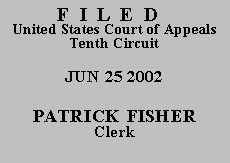

| UNITED STATES OF AMERICA,
Plaintiff - Appellee, |
|
| v. | |
| ANTHONY HODGES,
Defendant - Appellant. |
98-CR-20044-KHV)
|
Anthony Hodges seeks a certificate of appealability (COA) to appeal the district court's denial of his 28 U.S.C. § 2255 motion to vacate, set aside, or correct his sentence. We deny a certificate of appealability and dismiss the appeal.
Hodges was convicted of possession with intent to distribute crack cocaine, 21 U.S.C. § 841(a)(1), and sentenced to a term of imprisonment of 151 months and a term of supervised release of five years. His conviction was affirmed in United States v. Hodges, 208 F.3d 227 (10th Cir. 2000) (unpublished). Hodges filed his § 2255 motion on March 9, 2001, claiming the federal district court lacked subject matter jurisdiction. The district court denied the motion on March 26, 2001.(1)
On appeal, Hodges contends "[t]he District Court was without subject matter jurisdiction to indict, try, convict, sentence, and imprison petitioner." Br. attach. at 1. He argues (1) that the prosecution failed to prove a nexus between his conduct and interstate commerce, (2) that the crime was not committed on federal property, and (3) that the state did not cede jurisdiction.
Nexus between conduct and interstate commerce -- "[T]he conduct regulated by the Drug Act clearly implicates interstate commerce, and Congress made explicit findings explaining the conduct's 'substantial and direct effect upon interstate commerce.'" United States v. Wacker, 72 F.3d 1453, 1475 (10th Cir. 1995). "Federal control of the intrastate incidents of the traffic in controlled substances is essential to the effective control of the interstate incidents of such traffic." 21 U.S.C. § 801(6).
Crime not committed on federal property Article I, section 8, of the United States Constitution "empower[s] Congress to create, define and punish crimes, irrespective of where they are committed." United States v. Collins, 920 F.2d 619, 629 (10th Cir. 1990).
State did not cede jurisdiction Because under 18 U.S.C. § 3231 federal district courts are explicitly vested with jurisdiction over all offenses against the laws of the United States, see id., the federal government is not required to show that the state ceded jurisdiction. See United States v. Daily, 921 F.2d 994, 998 (10th Cir. 1990), disapproved on other grounds, United States v. Wiles, 102 F.3d 1043, 1054-55 (10th Cir. 1996).
The district court had jurisdiction over the charges brought against Hodges. As Hodges has failed to make "a substantial showing of the denial of a constitutional right," 28 U.S.C. § 2253(c)(1)(B), we DENY a certificate of appealability and DISMISS the appeal. The mandate shall issue forthwith.
Entered for the Court
Mary Beck Briscoe
Circuit Judge
*.This order and judgment is not binding precedent, except under the doctrines of law of the case, res judicata, and collateral estoppel. The court generally disfavors the citation of orders and judgments; nevertheless, an order and judgment may be cited under the terms and conditions of 10th Cir. R. 36.3.
1. On August 16, 2001, Hodges moved to supplement his § 2255 action. The district court transferred the motion to this court as an unauthorized second or successive application. In response to this court's notice, Hodges filed a motion for leave to file a second or successive motion, claiming his sentence was unconstitutional under Apprendi v. New Jersey, 530 U.S. 466 (2000). We denied the motion.